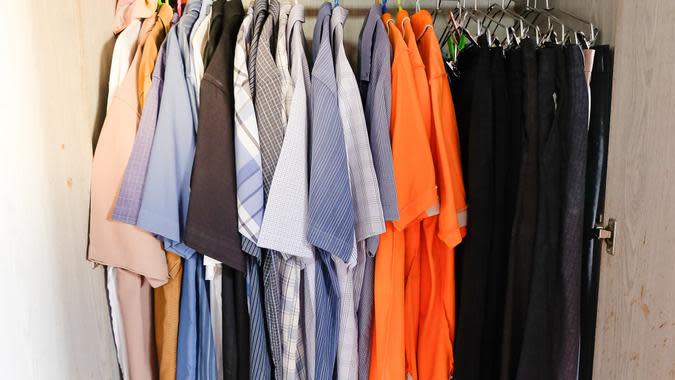Survival Tips If You’re Living Paycheck to Paycheck

Nearly one-half of Americans live paycheck to paycheck, according to a survey by the National Endowment for Financial Education, with credit card debt and employment struggles among the top reasons for financial trouble.
Find Out: Unplug These Appliances That Hike Up Your Electricity Bill
Food Stamps: Can You Use Your SNAP EBT Card at Gas Stations?
But, maybe you're not saddled with credit card debt and even have a full-time job. You might be making common money mistakes that are keeping you living paycheck to paycheck, like spending money without a budget.
See how you can get by and break the cycle of living hand to mouth.

Sell Things You Don't Need
A temporary fix to help you survive this month is to sell things you no longer need. That's one way Lauren Greutman, personal finance expert and author of "The Recovering Spender," said she and her family made ends meet when they were living paycheck to paycheck. Unloading items on eBay, Craigslist and even at yard sales can bring in extra cash to cover costs and create a cushion for emergencies.
"If you're living paycheck to paycheck, you need to find things to sell to put at least $500 in savings," she said. "You get rid of that stress of not knowing where your money is coming from."
Sometimes that means parting with things you love. Greutman said that her husband sold a drum set he played daily for $1,100 and put the money in savings to cover emergencies.
Poll: Do You Think the Government Should Increase SNAP Benefits?

Other Ways To Save
You likely have hidden sources of cash lying around your house. Maybe you have gently worn clothes that can be sold to resale websites such as thredUP, old computers or cellphones that can be sold to Gazelle, or books that can be sold on Amazon.
Spend an afternoon or two sifting through all of your personal belongings that are collecting dust, and write up an inventory to determine what can stay and what should go.

Get a Side Hustle
If you make decent wages but are still unsure why you're living paycheck to paycheck unable to stow away cash for savings, it might be time to pick up a side hustle.
Donna Freedman, author of "Your Playbook for Tough Times," said she did a series of odd jobs when she was struggling financially. For example, she earned $10 to $12 an hour babysitting. She also made money pet sitting, picking up mystery shopping gigs and participating in clinical trials.

Other Ways To Save
There are plenty of other ways to make more money this year -- from driving for a ride-sharing company such as Lyft to being a virtual assistant to tutoring kids.
If you want to follow in Freedman's footsteps, you can find legitimate mystery shopping opportunities -- which involve posing as a customer and completing questionnaires about your experience for $8 to $20 per hour -- through MSPA-NA.
For clinical trials, check ClinicalTrials.gov, a service of the U.S. National Institutes of Health, to find studies in your area that you might qualify for and get tips on what to expect during clinical trials.
You also can earn extra money or gift cards for everyday purchases from the comfort of your home by taking online surveys through sites such as Opinion Outpost and Swagbucks. And you can sign up at UserTesting to earn money for visiting a website or app, completing a set of tasks and sharing your thoughts about the experience.

Learn To Cook and Meal Plan
When her family was living paycheck to paycheck, Greutman said they had only $200 left for food each month after paying all of their bills. She stretched their small food budget by making a meal plan and using coupons.
She created what she called a free and cheap list before shopping trips. These were items she could get at the grocery store for little to no cost with coupons. Then, she planned meals around those items paired with whatever meat was on sale. Greutman spent about $50 per week on meats, fruits and vegetables and got other items for free, she said.

Other Ways To Save
Once you shrink your grocery budget, save more by not eating at restaurants or buying snacks. Freedman said that when she returned to college in her late 40s, she took her lunch every day. And she cooked dinner at home.
"People are fooling themselves if they think, 'It's the dollar menu!' or 'I have a coupon!'" she said. "Fact is, a sandwich and piece of fruit or some leftovers from last night's dinner are always going to be cheaper and probably healthier, too."
There are plenty of resources online that can help you make affordable meals, Freedman said. For example, cook Leanne Brown offers a free, downloadable version of her cookbook, "Good and Cheap," -- which has recipes for eating well on $4 a day -- on her personal website. Other resources include Budget Bytes and A Year of Slow Cooking.

Get Help Putting Food on the Table
If you're really struggling, don't be embarrassed to take advantage of programs that will help you buy food or get it for free, Freedman said.
You might qualify for SNAP, the Supplemental Nutrition Assistance Program, if your income is low enough. Each state has its own application process. If you qualify, you'll receive a monthly benefit through an Electronic Benefit Transfer card that can be used at authorized food stores.
"Your tax dollars fund it," Freedman said. "That's why you shouldn't be embarrassed to apply."

Other Ways To Save
Another government program to consider is WIC, or Women, Infants and Children, because they provide nutritious food to low-income mothers and children up to age 5. Freedman recommends visiting food banks offered by places of worship or checking Feeding America to find local food banks.
"Don't wait until the cupboard is bare before applying," Freedman said. "Both SNAP and WIC applications take time, and food banks may not be able to send you home the same day with a bag of groceries."

Eliminate Nonessential Expenses
Because you can't entirely cut essential expenses -- such as food -- when you're living paycheck to paycheck, look for nonessential expenses you can eliminate.
"I bought almost no new clothing for years," Freedman said. "Seriously, I'd wear a pair of thrift-store jeans until they were starting to fray, and then I'd go get another pair, paying as little as $2.99."
If your clothing is in decent shape, don't buy any more. "In fact, I'd suggest staying out of stores and malls entirely," Freedman said. "Just looking with a friend can turn into, 'Those slacks are only $5.99 -- what a steal!' And that's $5.99 you didn't need to spend."
If you have kids who are growing, you might have a friend who's willing to pass on clothes their kids have outgrown. The same goes for toys, books and games.

Other Ways To Save
Aside from new clothes, there likely are plenty of other things you don't need. If you're busy with a side hustle, you won't have time to watch cable TV. Ditch the gym membership and head to the park to walk or run. Stop paying for entertainment and take advantage of free activities in your community, such as art walks where galleries open their doors at no charge one night a month, Freedman said.
"Going from gallery to museum to college art center makes for an inexpensive night of culture," she said. "You'll almost certainly get fed, usually cheese and fruit and wine but sometimes fancier stuff."

Get Help Paying the Rent
If you live in one of the states mostly likely to live paycheck to paycheck, housing might be one of your biggest expenses. States like California have such expensive housing that your apartment rental could be eating up one-half or more of your take-home pay each month. To curb housing costs, Freedman recommends taking in a roommate.
"Start with your friends -- that is, let it be known among your besties that you've got a room for rent," Freedman said. "Maybe one of them is secretly hankering to save money, too, and will jump at the chance to terminate that month-to-month lease and move in."
Or, you might have a friend who has a room to spare that will cost you less to rent than your current place. Either way, make sure you write a rental agreement so everyone's clear on rent due dates and house rules, she said.

Other Ways To Save
If you don't know anyone who is looking for a roommate, you might also be able to find more affordable housing through the National Shared Housing Resource Center's website, Freedman said. It has a directory of state shared housing programs that can help match you with a homeowner offering housing in exchange for financial support or assistance with household tasks.
Another option if you're struggling is rent assistance, which might be available from groups such as the Salvation Army, the American Red Cross and Catholic Charities, Freedman said. Even small organizations might be able to help. For example, the church Freedman attended in Seattle gave out cash assistance, she said.

Downsize
One of the reasons Greutman was having trouble making ends meet was because she and her husband bought a house that was too expensive for them. So, they took a drastic measure.
"To get out of living paycheck to paycheck, we sold the house," she said. "We were so tired of being broke."
They were living in a 3,200-square-foot house with one child. They sold it and moved into an 800-square-foot rental townhouse. "It freed up $1,200 a month to pay down debt," Greutman said. "That's a move a lot of people don't want to make. I'm not sure we would've gotten to where we are now if we hadn't made that move."
Now that they have four children, the Greutmans live in an 1,800-square-foot house, which still is smaller and more affordable than the big, expensive house they sold to stop living paycheck to paycheck.

Other Ways To Save
There are several ways to score free housing if you can't cover your rent and don't want to impose on friends or family, Freedman said.
For example, being a house sitter can give you a temporary place to stay -- and maybe even extra cash for caring for someone's home. "I've gotten house sitting jobs in Los Angeles, Anchorage and Seattle simply by putting it out in the universe that I'm looking for a place to stay," Freedman said. You can possibly find house sitting positions through the website Caretaker.
You might also be able to exchange care or skills for housing, Freedman said. Perhaps you know an older relative who needs assistance with daily chores, a friend looking for a full-time nanny or someone with health issues who needs help.
"Handy folks might be able to land spots as apartment house managers," Freedman said. "I did this job myself, and it can be frustrating at times -- say, at 2 a.m. when a drunken tenant rings the doorbell to say he's lost his keys. But not having to pay rent each month is huge."
As these tips suggest, you might have to make sacrifices if you need to make ends meet each month. But these adjustments may only be temporary if you get your finances on track and break the cycle of living paycheck to paycheck.
More From GOBankingRates
This article originally appeared on GOBankingRates.com: Survival Tips If You’re Living Paycheck to Paycheck
